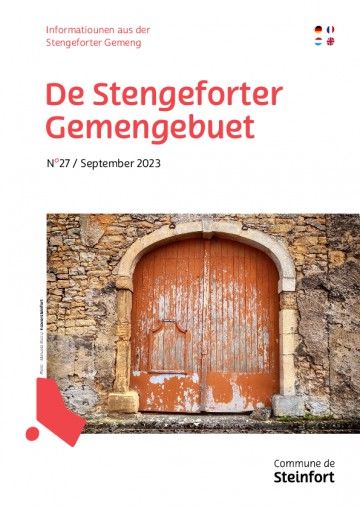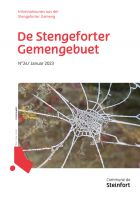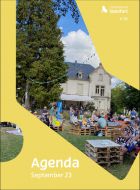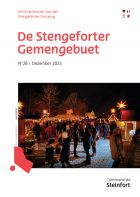De Gemengebuet N°27 September 2023
Nombre de téléchargement: 503
English version - Article Microagressions (p. 14 & 15)
Microaggressions
Last year, we presented to you our municipal cross-cutting action plan. One of the five outcomes we want to achieve is to institutionalise the principles of non-discrimination. This means that we don’t just want to make the public aware of certain issues, but we also want to make sure that the staff working for the Municipality have internalised non-discrimination. That’s why, in June this year, the entire staff took part in a training session on microaggressions.
But what are microaggressions? They are actions, comments and looks that are the result of prejudice. It is usually the case that the microaggressor didn’t mean to hurt anyone or treat anyone unfairly. Microaggressions are closely linked to discrimination, which can be based on seven grounds*:
- membership or non-membership, actual or supposed, of a race or ethnic group;
- sex/gender;
- sexual orientation;
- religion or beliefs;
- disability;
- age;
- nationality
When it comes to microaggressions, it’s often the case that the intention doesn’t match the effect. That’s because microaggressions are comments and behaviours based on bias and (unconscious) discrimination. For example, asking a Black Person where they are from is not necessarily a problem. But if they say, “From Hagen”, and then you ask, “But where are you REALLY from?” because you want to know a person’s origins, then that’s a microaggression. Why is that a microaggression? Well, on the one hand, you are expressing a bias by assuming that a non-white person cannot possibly come from a Luxembourgish village. On the other hand, it’s a very hurtful question, because you are basically telling that person: “You don’t belong here”.
Microaggressions are rarely easy to spot, and it’s not a single comment or action that does all the damage, but the accumulation of many such experiences. It can happen to anyone to inadvertently hurt someone. The point is not to stop talking to each other for fear of saying the wrong thing, but to be aware of what we say to whom and how. And also to listen when someone tells us that a certain comment or action was hurtful and to question our own behaviour.
No one is perfect, but if we all pay a little bit of attention to how we treat each other, we can make a big difference.
Read more about microaggressions here:
https://www.rpharms.com/recognition/inclusion-diversity/microaggressions
*You can find more information about discrimination here: https://luxembourg.public.lu/en/living/quality-of-life/discrimination.html
*****
English version - Article Responsible consumption (p. 16 & 17)
Responsible consumption
We consume every day, and to do so we use many of our planet's natural resources. Just to feed ourselves, we use fruit and vegetables (have you had enough of courgettes yet?), either for ourselves or to feed our animals.
Then there are the things we use. For example, to drink a glass of water, we also need sand, the main resource used to make glass. Without sand, we would always have to walk to the tap and drink water by hand. Without sand, our houses wouldn't be built and our bikes, buses and cars wouldn't have roads to travel on.
Did you know? Not all types of sand can be used in glass making or construction. Desert sand is too fine and doesn't stick well enough. So desert cities like Dubai have to import their sand from other countries.
And sand is just one of many resourcs. A mobile phone alone uses 60 different materials, including gold, zinc and oil in the form of plastic.
We're not always aware of this information, and in everyday life, we often just consume according to time. And between work, housework, family and friends, and hobbies, time is limited. As a result, we often throw things away or make impulse purchases without asking ourselves if we really need them.
Conscious, sustainable consumption not only saves our environment and its resources, but also our wallets :-)
Did you know? To manage our resources sustainably, we can follow the principle of 3 different strategies:
- The efficiency strategy = produce better. This means using fewer resources (energy & materials) for the same benefit.
- The consistency strategy = produce differently. Following nature's example, this means using renewable energies and reusable materials.
- The sufficiency strategy ("sobriety") = produce and consume less. Avoiding unnecessary waste helps to conserve natural resources.
Several information evenings will help you to find out exactly what this means for our consumption and how you can better care of our planet.
In collaboration with the municipality of Koerich, CELL (Centre for ecological learning Luxembourg) and Klima-Agence, we are organising the following evenings:
On 11 October 2023 at 7pm, screening of the film "Eng Äerd" (One Earth) at Windhof, Solarwind building. The film shows practical examples from Luxembourg of how, with a lot of creativity, it is possible to imagine new ways of using our natural resources wisely and in a spirit of solidarity.
On 19 October 2023, workshops will be held at the Al Schmelz cultural centre in Steinfort to reflect on our own consumer patterns and discuss alternatives together.
On 7 November 2023, the Klima-Agence will be offering advice on grants. Any commitment to renovate or equip a house can also help to conserve resources. This will once again take place at Windhof in the Solarwind building. There will also be a tour of the building that evening.
More information will be available in the next Agenda. We look forward to seeing you there.
*****
English version - Sustainability and environmental protection at the German national garden show in Mannheim (p. 18 & 19)
Sustainability and environmental protection at the German national garden show in Mannheim
The German national garden show - a flower show that is getting on in years? Far from it! Because the BUGA23 is bursting with innovation in the spirit of the times and is also worth a visit for anyone who is not (yet) familiar with gardening.
The German national garden show in Mannheim has dedicated itself to sustainability in line with the current needs of our society. The basis for this is formed by four guiding themes, which can be found in all areas, from exhibition contributions to the program of events: climate, environment, energy and food security. The guiding themes were developed from the City of Mannheim's Guiding Principles 2030 and the 17 Sustainable Development Goals of the United Nations (= SDGs). Together with numerous partners, solutions for future-relevant issues are being researched and demonstrated in all areas.
Two different areas can be visited during BUGA23: the Luisenpark, which served as the German national garden show in 1975, and the actual exhibition area, the Spinelli Park, which was used by the US Army as a military base from 1948 to 2012. Whereas a walk through the Luisenpark shows old trees, magnificent flowerbeds, streams and places to linger, the Spinelli Park shows numerous exhibition contributions that encourage visitors to marvel, participate, think and do. Here you will find innovative contributions such as PeePowerTM (generating electricity from urine) or U-Shift (autonomous driving), climate-resilient plants in the gardens of the Association for Garden, Landscape and Sports Ground Construction, inspiration for the home garden and contributions around the appreciation of food.
For the municipality of Steinfort, BUGA23 serves as a remarkable source of inspiration. The design of the gardens and the use of the parks is groundbreaking in terms of creating green spaces that are close to nature and adapted to climate protection. This in harmony between people and nature. The topics of social sustainability and the circular economy are not neglected either, for example with many exhibition areas on the careful use of resources, building with renewable raw materials, art in green spaces and inclusion.
BUGA is still open until 8 October 2023.
More information at www.buga23.de
*****
Version française - L’action «Gielt Band»: Contre le gaspillage alimentaire dans les vergers (p. 20 & 21)
L’action «Gielt Band»: Contre le gaspillage alimentaire dans les vergers
Les kilos de fruits mûrs qui chaque année pourrissent sous les arbres dans les vergers, les jardins et sur les places publiques, c’est tout simplement du gaspillage. Le remède est facile: ramasser et cueillir ces pommes, poires, prunes etc. et en faire une compote ou de la confiture, en presser le jus ou faire une tarte.
Mais il y a un hic: la cueillette sans autorisation du propriétaire est interdite. La solution? L’action «Gielt Band» que le ministère de l’Agriculture, de la Viticulture et du Développement rural a lancée en collaboration avec le Syndicat des villes et communes luxembourgeoises (Syvicol). Les communes, les personnes privées, les associations et les entreprises peuvent – à l’aide d’un ruban jaune – signaler les arbres fruitiers dont ils sont les propriétaires et dont les fruits peuvent être récoltés par le public. Le ministère de l’Agriculture, de la Viticulture et du Développement rural participe avec les arbres sous sa tutelle.
Ici, la cueillette est autorisée.
Quand les fruits sont mûrs et prêts à être cueillis, des rubans jaunes (en coton, donc recyclables) seront attachés aux arbres concernés et chacun peut, sans consultation préalable avec le propriétaire et de manière gratuite, faire la cueillette des fruits pour son usage personnel – en respectant la charte de comportement, que vous trouvez aussi dans ce magasine.
La commune de Stengefort invite ici les citoyens à ceuillir les fruits des arbres sur leurs surfaces publiques. Par exemple, au verger communal à Kleinbettingen dans la Rue du Chemin de Fer.
Faites attention aussi à d’autres places pour le ruban jaune, marquant que vous pouvez y ceuillir!
Si vous souhaitez participer à l’action avec vos propres arbres, veuillez vous adresser à www.antigaspi.lu
















